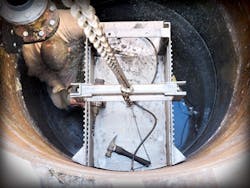About the author: Stacy Peshkopia is global product manager for JWC Environmental’s commercial and industrial products. Peshkopia can be reached at [email protected].
Repeatedly approaching a problem with the same tactic rarely yields a change in outcome. Oftentimes, it takes the consideration of a new perspective to hit upon the ideal solution.
Such was the case at the Villas at Mountain Vista in North Las Vegas, a 400-unit apartment complex situated within a stone’s throw of the Las Vegas strip. The development is host to amenities, including a pool, a fitness center, a security gate and an ideal location.
The complex also was fitted with all the necessities to handle the waste generated by residents, including an on-site lift station equipped with stainless steel-bladed pumps to transport influent. While the pumping of sewage out to the municipal collections system should be fairly standard, the complex frequently encountered pump malfunctions, which became a cause for concern. Typically, the complex’s solution involved replacing broken-down pumps—at a cost of $3,000 to $3,500 per repair—or even installing larger pumps. After repeatedly encountering this issue and repeatedly trying the traditional solution, the problem persisted. Plumbing Enterprises representative Colin Pirrie figured out why.
Pirrie is the on-site treatment manager of Villa Mountain Vista and was hired by the property management company to handle any sewage and plumbing issues that occur at the complex. He knows a great deal about what goes for a swim after getting flushed—most of which does not belong there. According to Pirrie, it is the unexpected items that create the biggest headaches.
Although he has yet to find something as valuable as a diamond ring, Pirrie noted that when objects such as wipes, clothing, toothbrushes and superhero toys (to name a few) reach the pumps, they are not broken down and, inevitably, clog or damage the system. Unclogging pumps is labor-intensive, time-
consuming and expensive. Adding to the complexity, anyone who performs the task is required to be trained and certified in confined space entry, according to OSHA Confined Space standard 29 CFR 1910.146.
Determined to find the best solution for his customer and put an end to the never-ending process of removing broken pumps, repairing and reinstalling them, Pirrie combed the internet for guidance. During his search, JWC Environmental, a manufacturer of industrial wastewater grinders, caught his attention with its Muffin Monster grinder. The grinder offered a solution to unwanted debris in the sewer system, and could shred every item flushed down the toilet—even superhero toys.
A little further digging and some reading on the benefits of the Muffin Monster convinced Pirrie that it was a solution for the sewage issues at the Villas at Mountain Vista. But his research also brought him to a troubling realization: The tight design of the Villa Mountain Vista wet well would limit his options. Nevertheless, he decided to approach the company with his concern.
A Super Solution
JWC offered Pirrie a customized Muffin Monster configuration for his specific application, which would accommodate the confines of the wet well. By utilizing a right-angled gear reducer, the overall height of the grinder was reduced to a size that would fit his pump station.
JWC is no stranger to these types of challenges. For more than 40 years, the company has worked with both private facilities and municipal customers to protect sewage pumps in waste systems. More recently, with the introduction and widespread use of disposable wipes, JWC has adapted its grinders to keep up with the changes in the wastewater stream. Its Wipes Ready technologies, introduced in 2014, are designed to specifically target rags and disposable wipes that are becoming more and more prevalent. The new cutters shred baby wipes and diapers, along with tough solids, into pieces that are small enough to stay in suspension and remain pumpable.
This tailor-made approach is more cost-effective than repeatedly unclogging and repairing pumps, and the grinders provide waste preconditioning to protect the current lift station pumps and extend their working life. The result is a reduction in maintenance—and stress—for system operators.
Easy Install
Pirrie also benefited from the simplicity of ordering and installing the Muffin Monster system.
The grinder system comes equipped with a customized stainless steel mounting frame that attaches to the existing sump. Once the frame is mounted in the wet well, the grinder simply slides into the frame.
Three men joined Pirrie to help with the one-day installation. As it was their first experience with this type of product, the team worked slowly and methodically to ensure everything was installed correctly.
Their labor paid off. In the months since the installation, there has been no need for service. The pump, which routinely clogged on a weekly basis before the install, has not seen a failure.
In a 90-day period, approximately $20,000 was saved—resources typically spent on removing, repairing and reinstalling new pumps.
The success at the Villas at Mountain Vista inspired Pirrie to order a second Muffin Monster system for another customer facing similar challenges. Why? As Pirrie said, you never know what will come swimming down the toilet.
